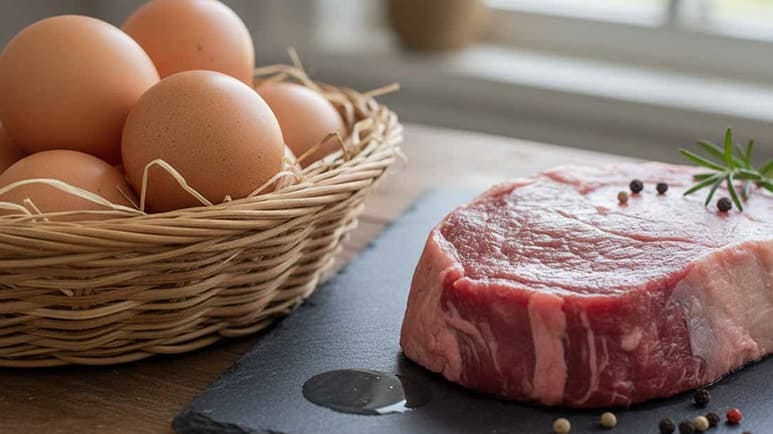A Cysteine-Rich Diet Promotes Regeneration of Your Intestinal Lining
Description
STORY AT-A-GLANCE
A cysteine-rich diet helps your gut repair itself by activating the stem cells that rebuild your intestinal lining, strengthening your digestion and overall resilience
Researchers found that cysteine triggers a communication loop between intestinal cells and immune cells, turning on the body’s natural repair signals for faster healing after damage
Eating more cysteine-rich foods such as eggs, grass fed meat, and raw dairy protects your gut from inflammation and improves recovery after stress, illness, or medical treatments
Supplemental N-acetylcysteine (NAC), a stable form of cysteine, offers additional support by boosting glutathione, your body’s master antioxidant, which protects gut tissue from oxidative stress and toxins
Avoiding seed oils and processed foods while increasing cysteine intake helps your intestinal lining regenerate efficiently, leading to better digestion, higher energy, and a stronger immune system

Your gut lining is one of the most active and self-renewing tissues in your body. Every few days, millions of cells are replaced to keep your intestinal barrier strong and your digestion efficient. But that renewal process depends on more than time — it requires specific nutrients that fuel regeneration. When those nutrients are missing, your gut becomes fragile, leaving you more prone to inflammation, poor absorption, and chronic discomfort.
Cysteine, a sulfur-containing amino acid found in everyday foods like eggs, meat, and dairy, has emerged as one of the key players in this renewal process. Unlike most nutrients that simply provide energy or structure, cysteine helps your body activate its own repair mechanisms.
It influences the way your intestinal cells communicate with your immune system, guiding the regeneration that keeps your gut lining intact. The discovery of cysteine’s role in intestinal healing is changing how scientists view diet and recovery. Rather than relying solely on medical interventions after damage occurs, the focus is shifting toward using targeted nutrition to drive regeneration from within.
This approach offers a new way to support gut health, especially for those dealing with the side effects of toxins, medication, or chronic stress. Recent scientific findings reveal the precise mechanisms that make cysteine such a powerful nutrient for intestinal repair. This knowledge could reshape your approach to digestive health.
Cysteine Sparks Gut Repair Through Immune-Cell Communication
In a study published in Nature, researchers demonstrated that dietary cysteine enhances the body’s ability to repair damage in the small intestine.1 The study focused on how cysteine influences intestinal stem cells, the specialized cells that replace and regenerate the lining of your gut. In simple terms, these stem cells act as the gut’s construction crew, repairing tissue that’s been damaged by illness, toxins, or treatments like chemotherapy.
Cysteine enhances “stemness,” or the ability of these cells to regrow new tissue — The research team discovered that when cysteine intake increased, intestinal stem cells became more active, leading to faster and more complete regeneration.
<label class="hide-text" contenteditable="false">Text within this block will maintain its original spacing when published</label>This finding is significant because the small intestine must constantly rebuild itself — roughly every five days — to maintain barrier integrity and nutrient absorption. Without this renewal, inflammation and infection set in quickly, compromising digestion and overall health.
The study was conducted in mice but reveals key principles applicable to human health — Mice given a cysteine-enriched diet showed remarkable improvements in how their intestines recovered after injury.
<label class="hide-text" contenteditable="false">Text within this block will maintain its original spacing when published</label>The cysteine-fed group had thicker, healthier intestinal walls and faster tissue renewal compared to control groups that didn’t receive extra cysteine. This suggests that dietary amino acids directly influence gut recovery, not just through nutrient supply but by altering cellular signaling within the intestinal lining.
Your gut has a built-in repair signal that tells cells when to rebuild — When this natural signal was activated, the gut’s repair cells started multiplying quickly and creating fresh, healthy tissue. The intestinal wall became stronger and healed faster after damage. But when researchers shut off that signal or removed the immune cells that trigger it, the healing stopped completely — showing that cysteine works by switching on your body’s own repair response.
Cysteine is converted into a special compound that starts the healing process — Researchers discovered that cysteine itself isn’t what repairs your gut — it’s what your body turns cysteine into. Once converted, this compound acts like a messenger that tells your intestinal cells and immune system to start rebuilding the damaged lining. It’s the spark that gets the repair system running.
<label class="hide-text" contenteditable="false">Text within this block will maintain its original spacing when published</label>However, if your cells can’t absorb cysteine, your gut won’t heal. When researchers blocked the tiny transport gate that lets cysteine into intestinal cells, the repair process stopped entirely. That means it’s not just about eating enough protein — it’s about making sure your gut takes in and uses cysteine properly to trigger healing from the inside out.
A cysteine-rich diet could protect your gut health — By showing that cysteine supports both the immune system and stem cell function, the study reveals how a single nutrient orchestrates multiple biological systems to restore balance. It’s a new form of dietary immunotherapy — using what you eat to direct your body’s own repair mechanisms.
<label class="hide-text" contenteditable="false">Text within this block will maintain its original spacing when published</label>This means that increasing cysteine intake through foods like eggs, grass fed meat, and dairy could help your intestinal lining recover more efficiently from stress or illness. The findings also encourage a shift in how we view amino acids: not just as building blocks of protein but as active regulators of healing and regeneration.
Cysteine Accelerates Gut Healing After Radiation Damage
The researchers specifically noted that eating a cysteine-rich diet rejuvenates the sm






